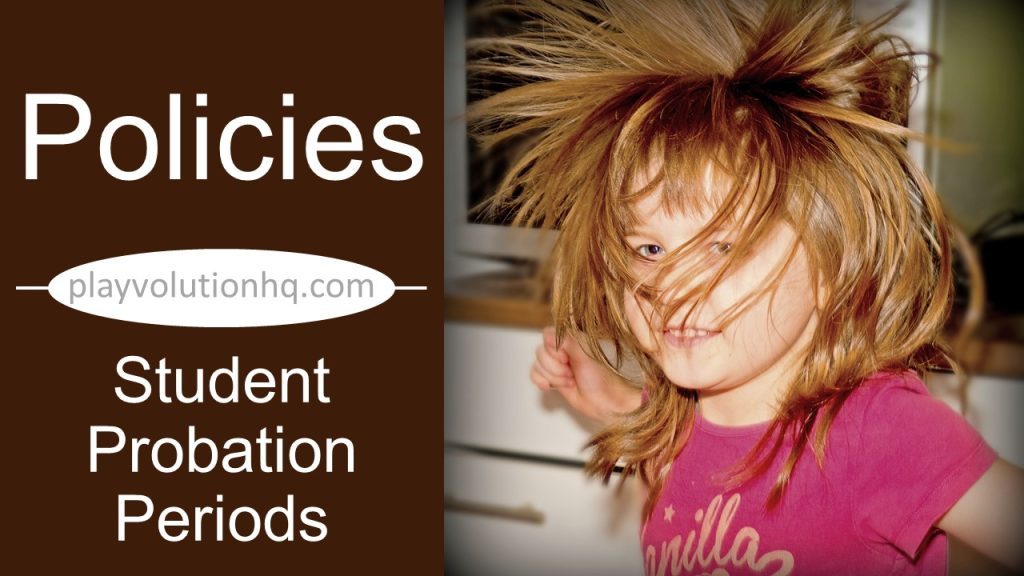
Student Probation Periods Overview
Many programs choose to require student probation periods (or trial, or introductory periods) to their students upon admittance: usually a period of two weeks to thirty days when either the program or the family can terminate services – at any time, for any reason – without typical contract-breaking penalties or requirements. This is typically done to ensure that the program is a good fit for the child, and that the child is a good fit for the program.
This post is intended to spark reflection and suggest ways of addressing the topic covered when writing or updating policies and procedures. Your policies and procedures should be written to meet your program’s needs and unique circumstances.
Browse More Policy & Procedure Resources Here
The question then becomes “what does it mean to be a good fit for a program?” and the answer is “it depends.” Your context, your hours, your schedule, your community, and your vibe are specific; there’s no way anyone could write a definitive list of what makes children a ‘good fit’ for care.
I will say that preschool is a time of tremendous growth, meaning that a child who comes in without knowing how to use a fork is not necessarily a ‘poor fit’: it’s possible that lots of behaviors just require lots of learning that haven’t happened yet. It’s also possible that you, the provider, can’t accommodate all the behaviors that might pop up. This is a personal call, and usually involves a lot of conversation with staff and families to earnestly try to create an environment that works for a child before deciding to terminate care.
Either way, if you have student probation periods period, you’ve got a lot that goes into it: how long does it last? What communication will you have with families, and what might be expected of them? What happens at the end? Who is involved in the termination decision?
Some programs have families sign care contracts only after the trial period, or have them sign a trial contract and then another afterwards. Make sure any paperwork is very clear – it’s always a good idea to have a second (or third) set of eyes on something, especially if that pair of eyes knows anything about contract law.
Where to Include
At Playvolution HQ, we recommend using the Three Handbook Method.
Consider adding this policy to your Parent Handbook.
Considerations
- Many student probation periods have a clause that allows them to be extended, which theoretically could go on in perpetuity. How will you draw a hard line on when to end the period?
- If you start to notice that many children are not a ‘good fit’ for the program, consider your environment: what expectations are these children not fulfilling, and are those expectations appropriate?
- Is termination forever, or could the family reapply at another point in the future?
Sample Policies
NOTE: The following samples are real-world examples relating to this post’s topic and are provided as a reference for creating your own policies and procedures. Sharing them here is not a recommendation of their content.
Sample 1
Students attending preschool do so with a trial period during the first quarter. During this trial period, readiness in preschool will be assessed through observation. If the student is having difficulty adjusting to preschool, the parents will be informed that their assistance is needed. The parents will be required to assist with the student for part of or for the entire preschool day, as deemed necessary by the teacher and principal. If after the trial period the teacher and/or the principal find that preschool placement is inappropriate, the student will be disenrolled. Preschool children must be fully potty-trained without assistance.
Navy Hale Keiki School, Hawai’i, USA
Sample 2
A Good Match:
The provider exercises a 30 day trial period beginning the first day of services rendered. Until the conclusion of this 30 day trial period, either party may cancel this contract without further obligation. Possible conditions resulting in termination at any time may include lack of fulfilling payment obligations, refusal to complete child‘s enrollment forms or medical assessment, behavior by parent or child in which the Play Date Preschool students, staff, and other patrons are threatened or placed in threatening or dangerous circumstances, determination by the Director that the child is not developmentally ready for a large preschool environment at this time and is displaying signs of stress.
Play Date Preschool, California, USA
Sample 3
Upon initial enrollment of your child, there is a two (2) week probation period. During this time, if our program is not suitable for your child (due to child readiness, development, toilet-training problems, etc.), termination of enrollment may result. Since your child’s experience should be a happy, positive, and rewarding one, re-enrollment at a later date may be recommended. Upon termination of enrollment during this probation period, tuition will be pro-rated based on number of days scheduled and will be refunded accordingly. There is no refund for the one-time registration fee.
Petite Sarbonne Preschool, California, USA
Sample 4
All new children will be cared for on a ten day (Monday-Friday) trial period beginning on your child’s first actual day of care. During that time the parent or provider may terminate the child care agreement at any time. No pre-paid fees will be credited upon cancellation during the trial period. After the trial period, a two week notice is required by either party to terminate the agreement (see Termination Policy). Your enrollment fee and tuition is non-refundable. In cases of non-payment, legal actions may be taken and parent will pay all incurred legal expenses, including small claims court.
The Greenhouse Preschool, Texas, USA
Related Content


Brought to you by Explorations Early Learning
Contribute content to Playvolution HQ
Post Author
Student, teacher.


Leave a Reply